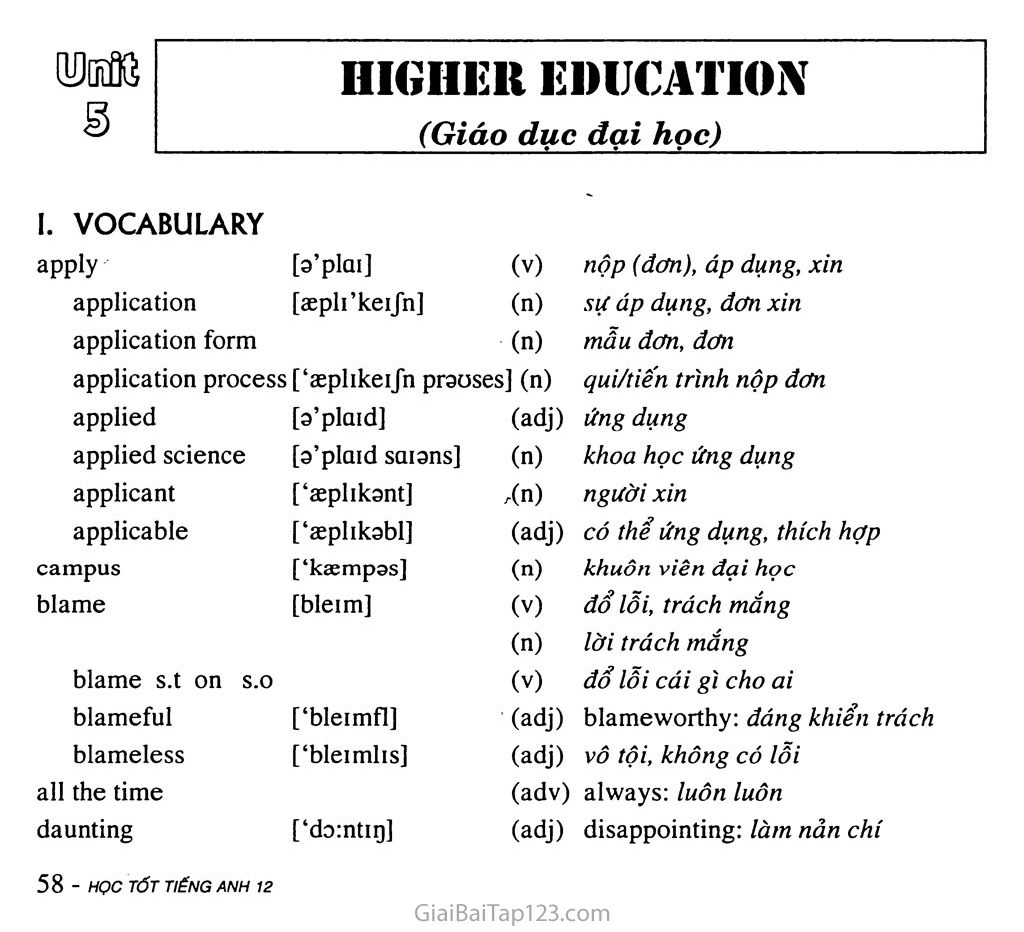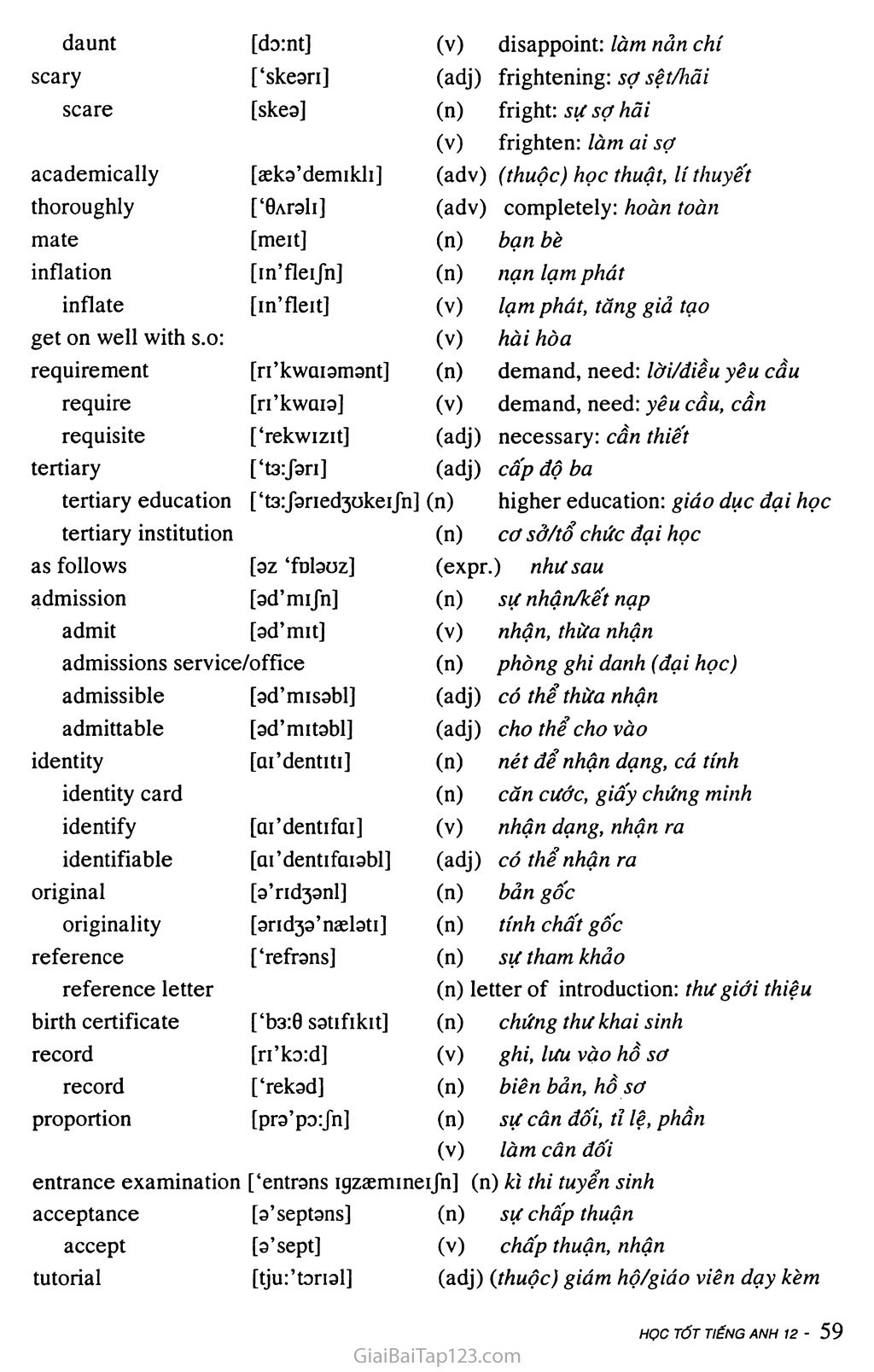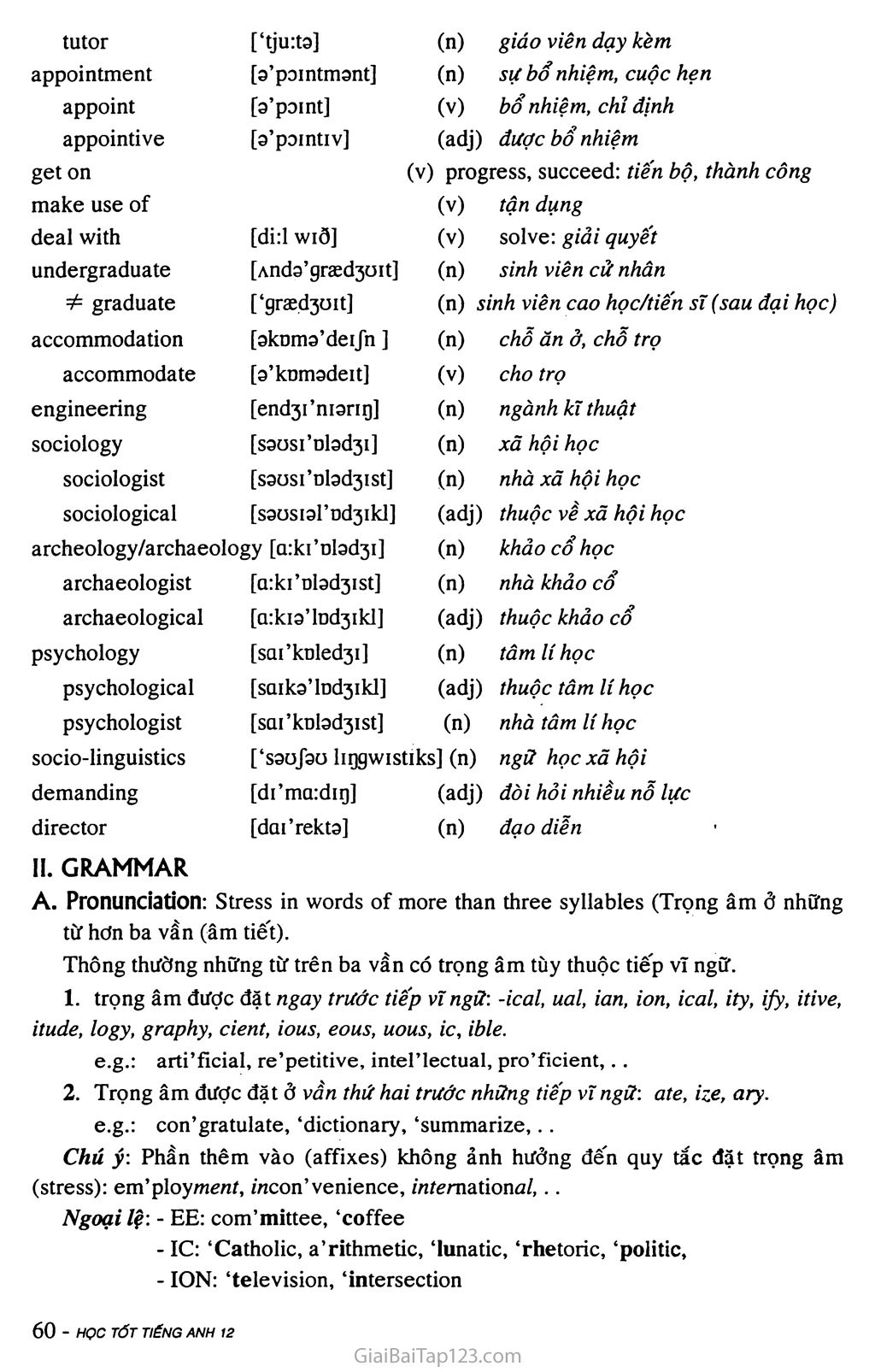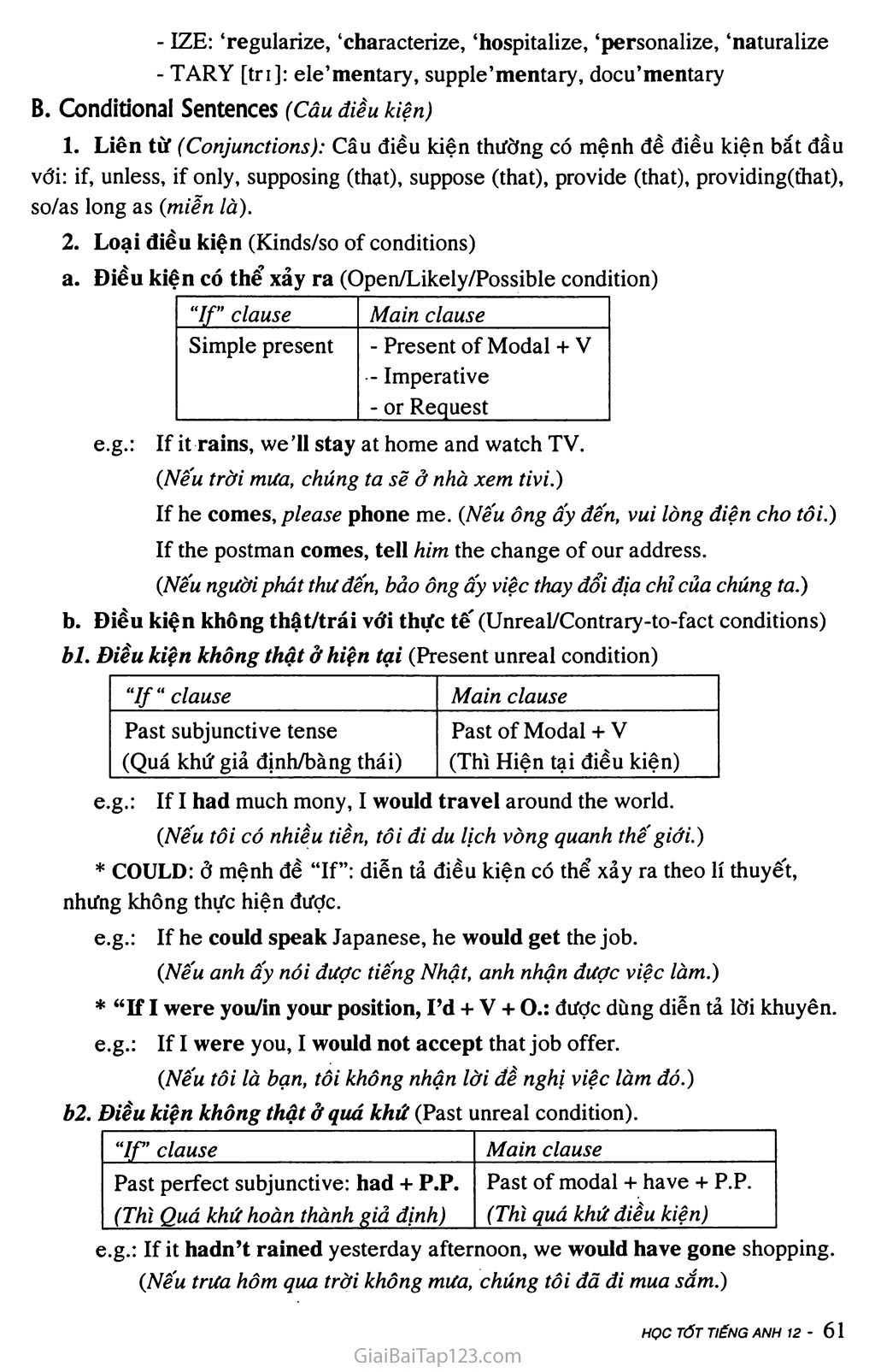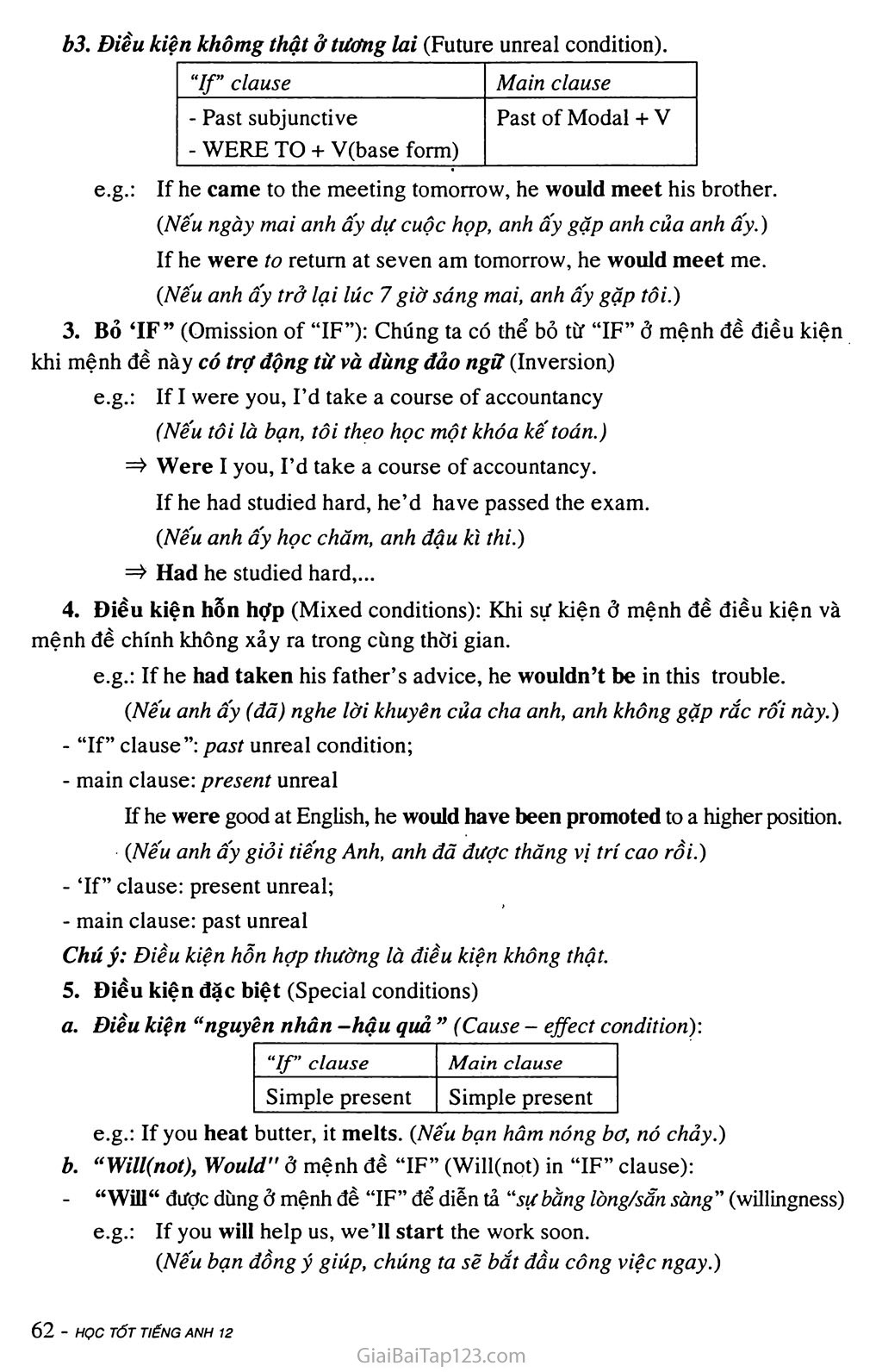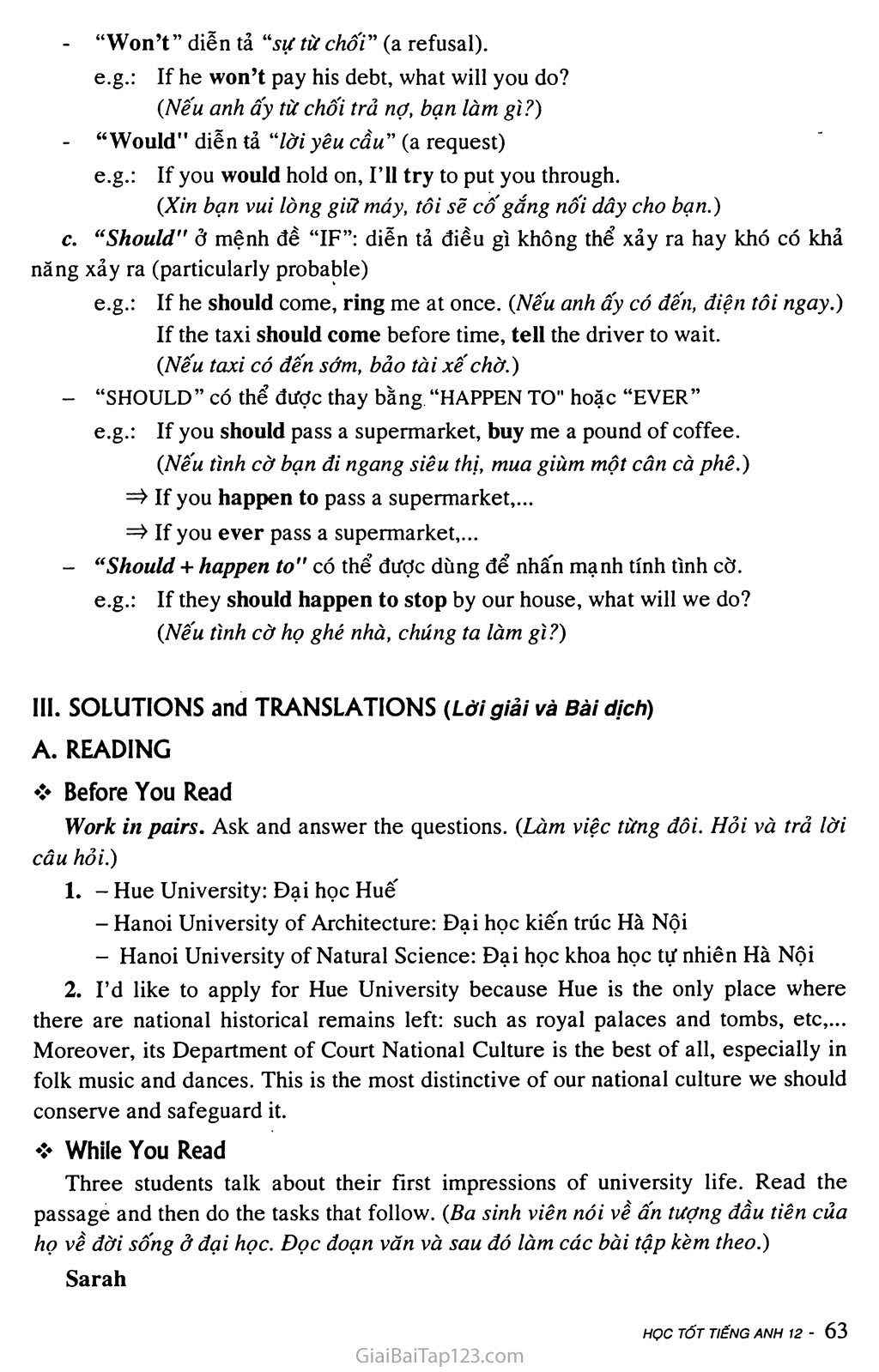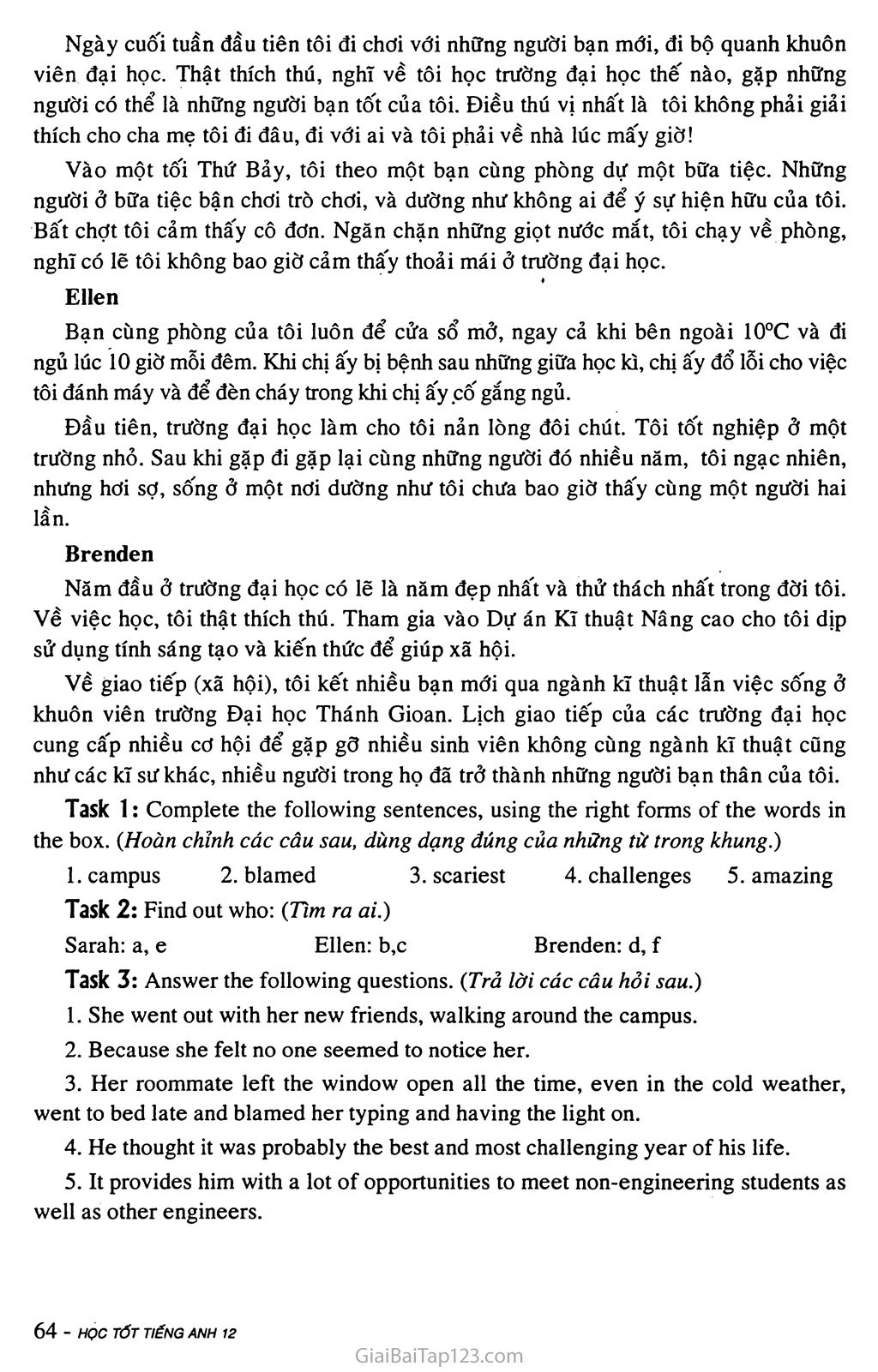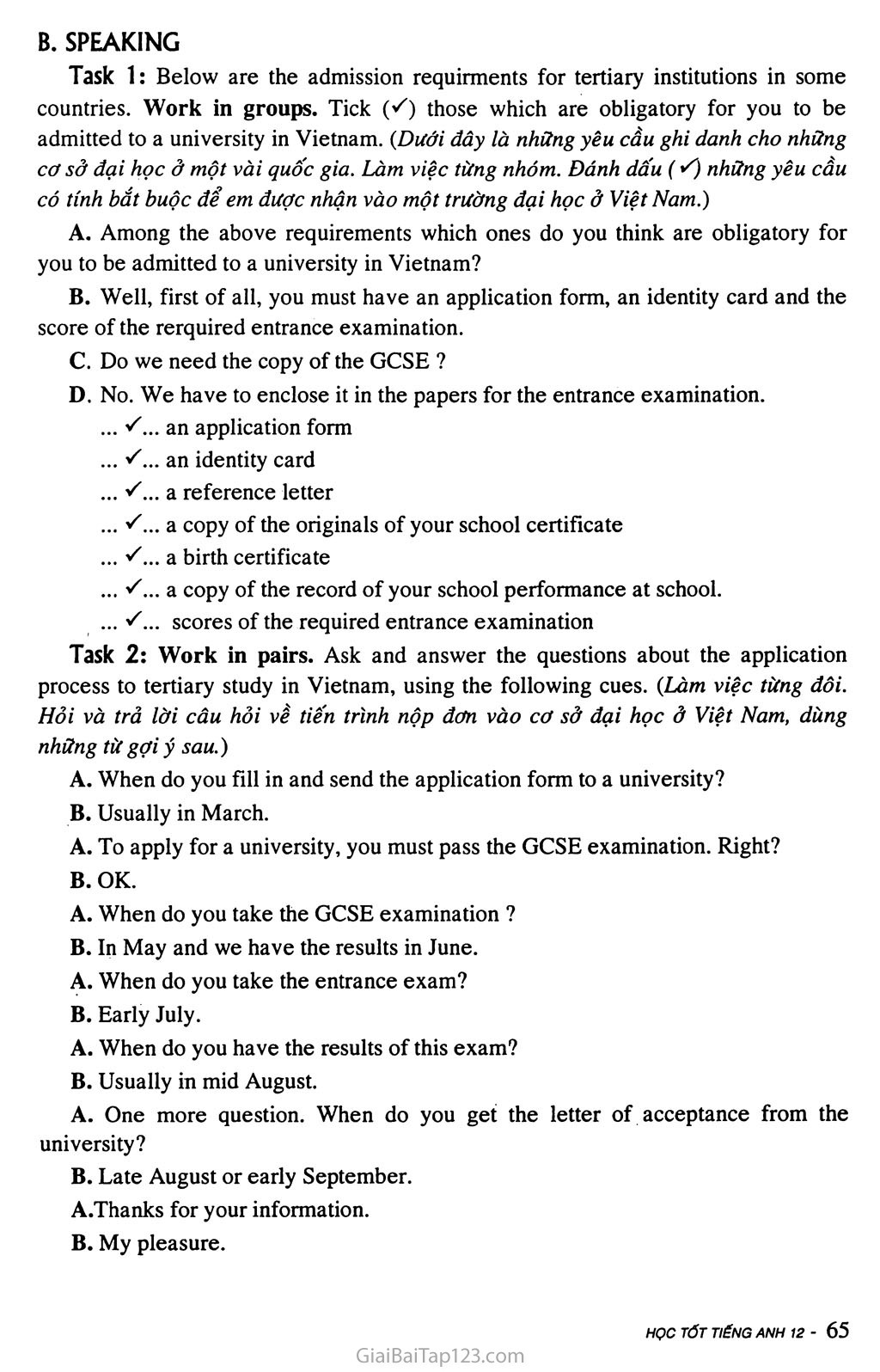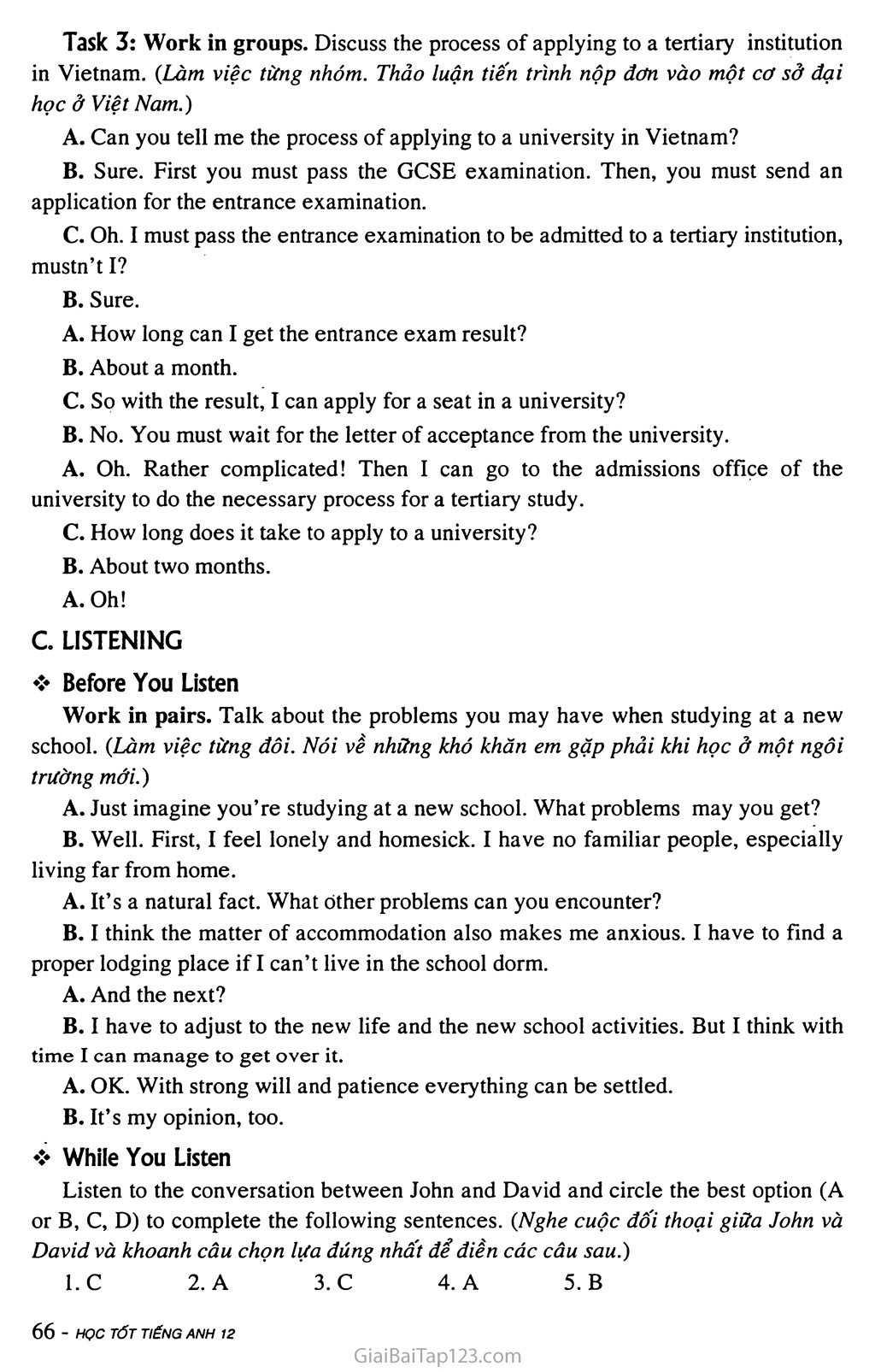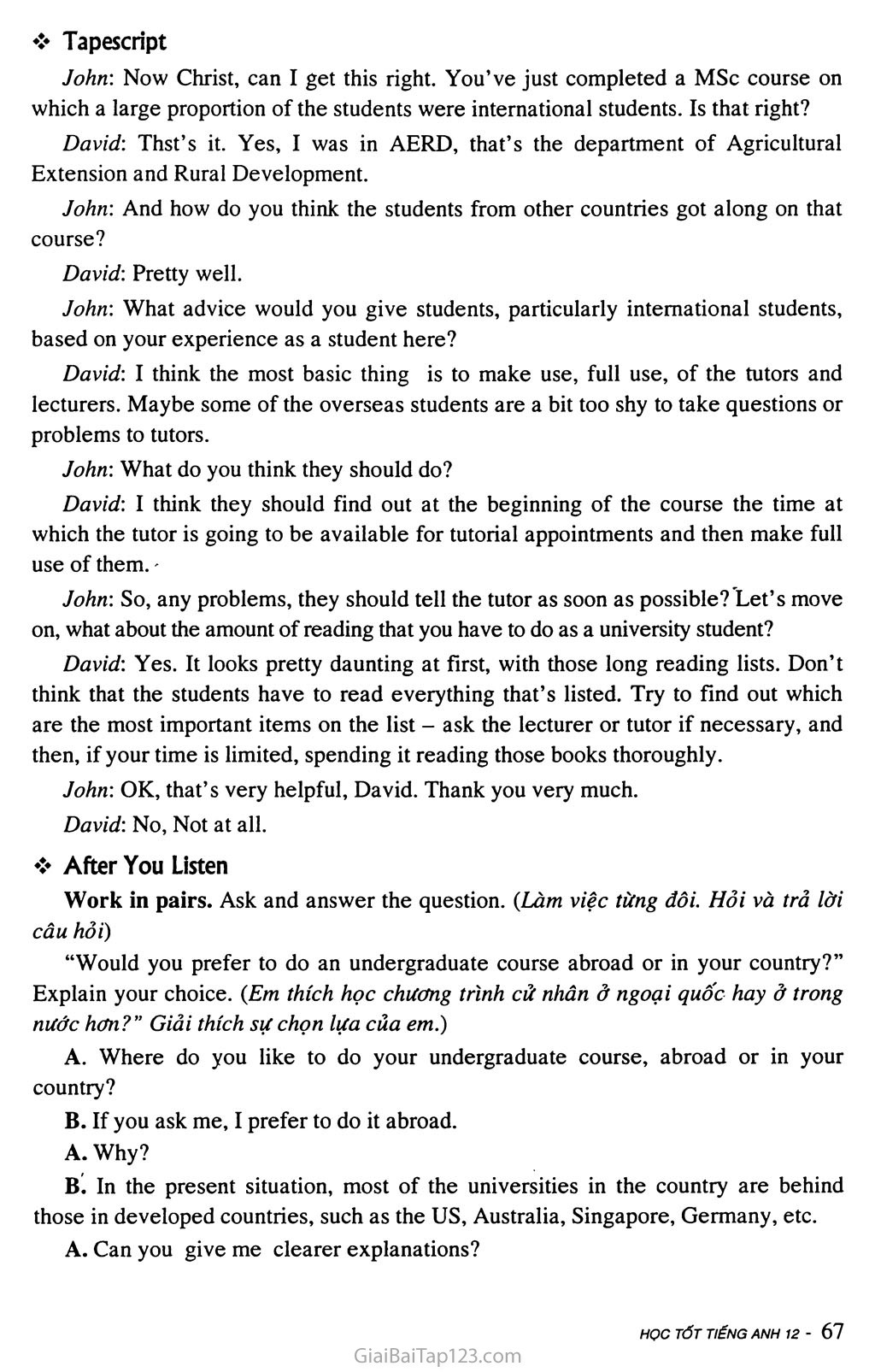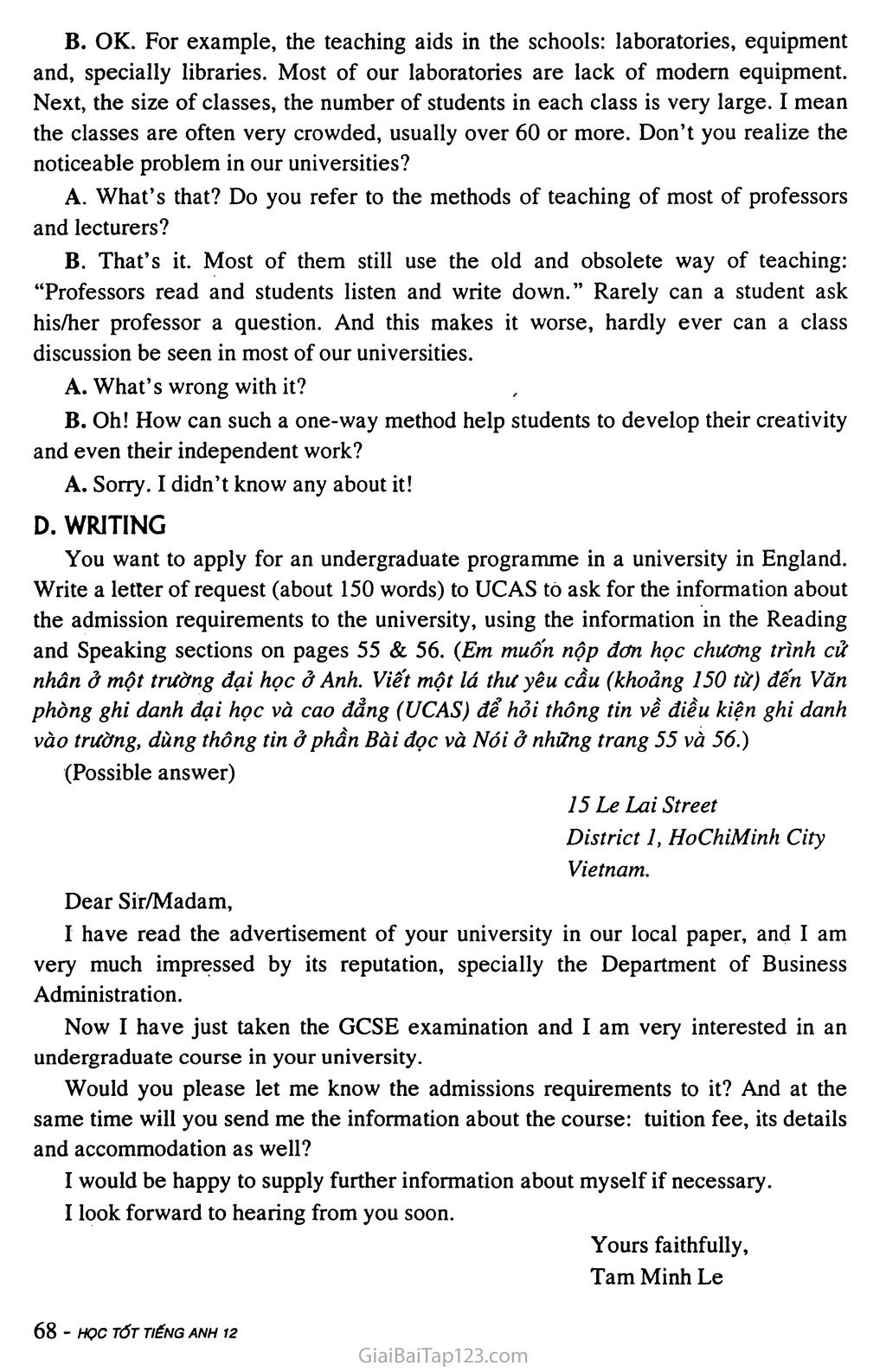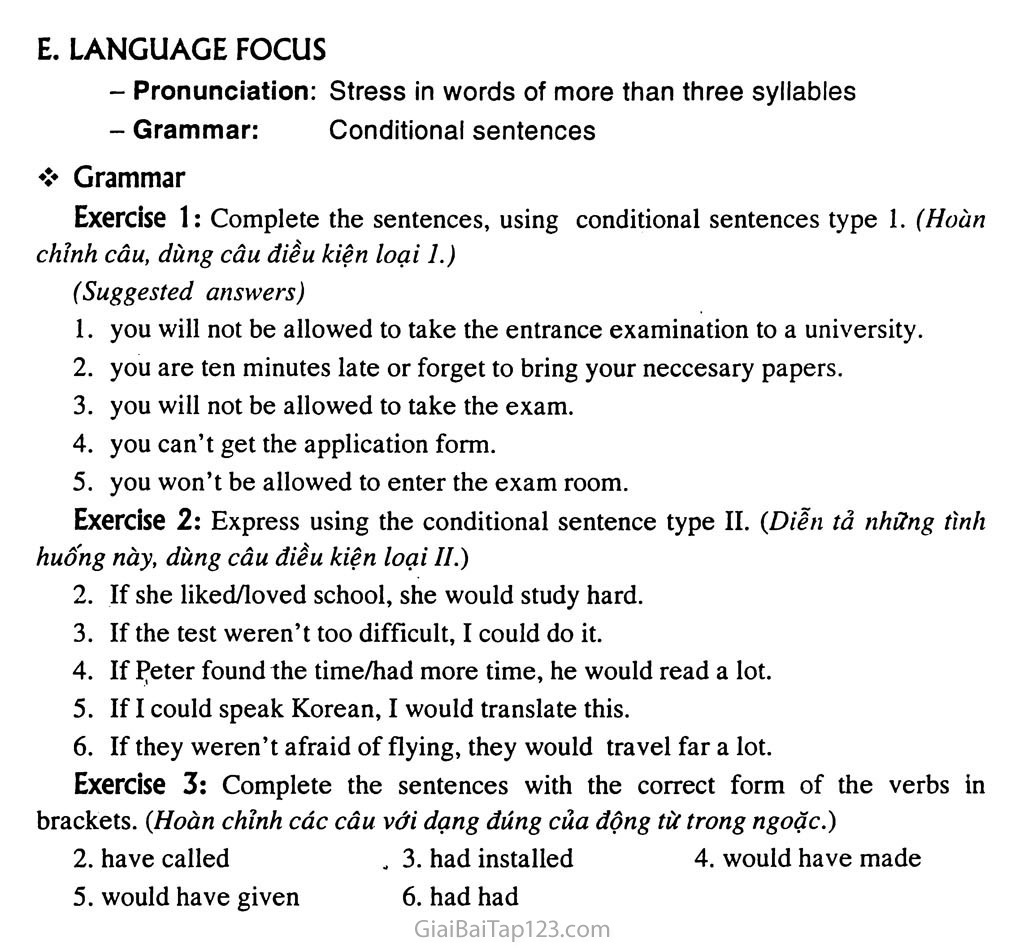Giải tiếng Anh lớp 12 Unit 5: HIGHER EDUCATION
HIGHER EDUCATION
(Giáo dục đại học)
I. VOCABULARY
apply
[o’plai]
(V)
nộp (đơn), áp dụng, xin
application
[aepli’keijn]
(n)
sự úp dụng, đơn xin
application form
(n)
mẫu đơn, đơn
application process [‘aeplikeijn prooses] (n)
qui/tiến trình nộp đơn
applied
[o’plaid]
(adj)
ứng dụng
applied science
[o’plaid saions]
(n)
khoa học ứng dụng
applicant
[‘teplikont]
Xn)
người xin
applicable
[‘aepliksbl]
(adj)
có thể ứng dụng, thích hợp
campus
[‘kaempas]
(n)
khuôn viên đại học
blame
[bleim]
(V)
đổ lỗi, trách mắng
(n)
lời trách mắng
blame s.t on s.o
(V)
đổ lỗi cái gì cho ai
blameful
[‘bleimfl]
(adj)
blameworthy: đáng khiển trách
blameless
[‘bleimlis]
(adj)
vô tội, không có lỗi
all the time
(adv)
always: luôn luôn
daunting
[‘domtirj]
(adj)
disappointing: làm nản chí
5 8 - HỌC TỔT TIẾNG ANH 12
daunt
[da:nt]
(V)
disappoint: làm nản chí
scary
[‘skeari]
(adj)
frightening: sợ sệt/hãi
scare
[skea]
(n)
(V)
fright: sự sợ hãi frighten: làm ai sợ
academically
[ieka’demikli]
(adv)
(thuộc) học thuật, lí thuyết
thoroughly
i‘0Arali]
(adv)
completely: hoàn toàn
mate
[melt]
(n)
bạn bè
inflation
[in’fleijn]
(n)
nạn lạm phát
inflate
[in’fleit]
(V)
lạm phát, tăng giả tạo
get on well with s.o:
(V)
hài hòa
requirement
[ri’kwaiamant]
(n)
demand, need: lời/điều yêu cầu
require
[ri’kwaia]
(V)
demand, need: yêu cầu, cần
requisite
[‘rekwizit]
(adj)
necessary: cần thiết
tertiary
[‘t3:Jari]
(adj)
cấp độ ba
tertiary education
[‘t3:jaried3okeijn] (n)
higher education: giáo dục đại học
tertiary institution
(n)
cơ sở/tổ chức đại học
as follows
[az ‘fDlaoz]
(expr.) như sau
admission
[ad’mijn]
(n)
sự nhận/kết nạp
admit
[ad’mit]
(V)
nhận, thừa nhận
admissions service/office
(n)
phòng ghi danh (đại học)
admissible
[ad’misabl]
(adj)
có thể thừa nhận
admittable
[ad’mitabl]
(adj)
cho thể cho vào
identity
[ai’dentiti]
(n)
nét để nhận dạng, cá tính
identity card
(n)
căn cước, giấy chứng minh
identify
[ai’dentifai]
(V)
nhận dạng, nhận ra
identifiable
[ai’dentifcuabl]
(adj)
có thể nhận ra
original
[a’rid^anl]
(n)
bản gốc
originality
[arid3a’nadati]
(n)
tính chất gốc
reference
[‘refrans]
(n)
sự tham khảo
reference letter
(n) letter of introduction: thư giới thiệu
birth certificate
[‘b3:0 satifikit]
(n)
chứng thư khai sinh
record
[ri’ka:d]
(V)
ghi, lưu vào hồ sơ
record
[‘rekad]
(n)
biên bản, hồ sơ
proportion
[pra’pajn]
(n)
sự cân đối, tỉ lệ, phần
(v) làm căn đối
entrance examination [‘entrans igzaemineijn] (n) kì thi tuyển sinh
acceptance
[a’septans]
(n) sự chấp thuận
accept
[a’sept]
(v) chấp thuận, nhận
tutorial
[tju:’tarial]
(adj) (thuộc) giám hộ/gí
tutor
[‘tju:t3]
(n)
giáo viên dạy kèm
appointment
[s’pointmant]
(n)
sự bổ nhiệm, cuộc hẹn
appoint
[a’point]
(V)
bổ nhiệm, chỉ định
appointive
[a’pointiv]
(adj)
được bổ nhiệm
get on
(v) progress, succeed: tiến bộ, thành công
make use of
(V)
tận dụng
deal with
[did wid]
(V)
solve: giải quyết
undergraduate
[Anda’grsedjoit]
(n)
sinh viên cử nhân
=# graduate
[lgraed3Oit]
(n) sinh viên cao học/tiến sĩ (sau đại học)
accommodation
[sknms’deijh ]
(n)
chỗ ăn ở, chỗ trọ
accommodate
[s’kDmsdeit]
(V)
cho trọ
engineering
[end3i’ni3rir)]
(n)
ngành kĩ thuật
sociology
[S3OSl’Dl3d3l]
(n)
xã hội học
sociologist
[S3OSl’Dl9d3ISt]
(n)
nhà xã hội học
sociological
[S3OSI3l’Dd3lkl]
(adj)
thuộc về xã hội học
archeology/archaeology [u:ki’ol3d3i]
(n)
khảo cổ học
archaeologist
[a:ki’Dl3d3ist]
(n)
nhà khảo cổ
archaeological
[a:ki3’lDd3ikl]
(adj)
thuộc khảo cổ
psychology
[sut’knled3i]
(n)
tâm lí học
psychological
[satks’hxfjikl]
(adj)
thuộc tâm lí học
psychologist
[sai ’knl3d3ist]
(n)
nhà tâm lí học
socio-linguistics
[‘ssojso liggwistiks] (n)
ngữ học xã hội
demanding
[di’ma:dirj]
(adj)
đòi hỏi nhiều nỗ lực
director
[dai’rekts]
(n)
đạo diễn
GRAMMAR
A. Pronunciation: Stress in words of more than three syllables (Trọng âm ở những từ hơn ba vần (âm tiết).
Thông thường những từ trên ba vần có trọng âm tùy thuộc tiếp vĩ ngữ.
trọng âm được đặt ngay trước tiếp vĩ ngữ: -ical, ual, ian, ion, ical, ity, ify, itive, itude, logy, graphy, cient, ious, eous, uous, ic, ible.
e.g.: artificial, repetitive, intel’lectual, pro’ficient,..
Trọng âm được đặt ở vần thứ hai trước những tiếp vĩ ngữ: ate, ize, ary. e.g.: congratulate, ‘dictionary, ‘summarize,..
Chú ý: Phần thêm vào (affixes) không ảnh hưởng đến quy tắc đặt trọng âm (stress): em’ployznenf, mcon’venience, international, ..
Ngoại lệ: - EE: com’mittee, ‘coffee
IC: ‘Catholic, Arithmetic, ‘lunatic, ‘rhetoric, ‘politic,
ION: ‘television, ‘intersection
IZE: ‘regularize, ‘characterize, ‘hospitalize, ‘personalize, ‘naturalize
TARY [tri]: ele’mentary, supple’mentary, docu’mentary B. Conditional Sentences (Câu điều kiện)
Liên từ (Conjunctions): Câu điều kiện thường có mệnh đề điều kiện bắt đầu với: if, unless, if only, supposing (that), suppose (that), provide (that), providing(that), so/as long as (miễn là).
Loại điều kiện (Kinds/so of conditions)
a. Điều kiện có thể xảy ra (Open/Likely/Possible condition)
"If" clause
Main clause
Simple present
Present of Modal + V
Imperative
or Request
e.g.: If it rains, we’ll stay at home and watch TV.
(Nếu trời mưa, chúng ta sẽ ở nhà xem tivi.)
If he comes, please phone me. (Nếu ông ấy đến, vui lòng điện cho tôi.) If the postman comes, tell him the change of our address.
(Nếu người phát thư đến, bảo ông ấy việc thay đổi địa chỉ của chúng ta.)
b. Điều kiện không thật/trái với thực tế (Unreal/Contrary-to-fact conditions) bl. Điều kiện không thật ở hiện tại (Present unreal condition)
“If" clause
Main clause
Past subjunctive tense (Quá khứ giả định/bàng thái)
Past of Modal + V (Thì Hiện tại điều kiện)
e.g.: If I had much mony, I would travel around the world.
(Nếu tôi có nhiều tiền, tôi đi du lịch vòng quanh thế giới.)
COULD: ở mệnh đề “If”: diễn tả điều kiện có thể xảy ra theo lí thuyết, nhưng không thực hiện được.
e.g.: If he could speak Japanese, he would get the job.
(Nếu anh ấy nói được tiếng Nhật, anh nhận được việc làm.)
“If I were you/in your position, I’d + V + o.: được dùng diễn tả lời khuyên, e.g.: If I were you, I would not accept that job offer.
(Nếu tôi là bạn, tôi không nhận lời đề nghị việc làm đó.) b2. Điều kiện không thật ở quá khứ (Past unreal condition).
“If" clause
Main clause
Past perfect subjunctive: had + p.p. (Thì Quá khứ hoàn thành giả định)
Past of modal + have + p.p. (Thì quá khứ điều kiện)
e.g.: If it hadn’t rained yesterday afternoon, we would have gone shopping. (Nếu trưa hôm qua trời không mưa, chúng tôi đã đi mua sắm.)
b3. Điều kiện khômg thật ở tương lai (Future unreal condition).
“If” clause
Main clause
Past subjunctive
WERE TO + V(base form)
Past of Modal + V
e.g.: If he came to the meeting tomorrow, he would meet his brother.
(Nếu ngày mai anh ấy dự cuộc họp, anh ấy gặp anh của anh ấy.)
If he were to return at seven am tomorrow, he would meet me.
(Nếu anh ấy trở lại lúc 7 giờ sáng mai, anh ấy gặp tôi.)
Bỏ ‘IF” (Omission of “IF”): Chúng ta có thể bỏ từ “IF” ở mệnh đề điều kiện khi mệnh đề này có trợ động từ và dùng đảo ngữ (Inversion)
e.g.: If I were you, I’d take a course of accountancy (Nếu tôi là bạn, tôi theo học một khóa kế toán.)
=7 Were I you, I’d take a course of accountancy.
If he had studied hard, he’d have passed the exam.
(Nếu anh ấy học chăm, anh đậu kì thi.)
=> Had he studied hard,...
Điều kiện hỗn hdp (Mixed conditions): Khi sự kiện ở mệnh đề điều kiện và mệnh đề chính không xảy ra trong cùng thời gian.
e.g.: If he had taken his father’s advice, he wouldn’t be in this trouble.
(Nếu anh ấy (đã) nghe lời khuyên của cha anh, anh không gặp rắc rối này.)
“If” clause”: past unreal condition;
main clause: present unreal
If he were good at English, he would have been promoted to a higher position. (Nếu anh ấy giỏi tiếng Anh, anh đã được thăng vị trí cao rồi.)
‘If” clause: present unreal;
«
main clause: past unreal
Chú ý: Điều kiện hỗn hợp thường là điều kiện không thật.
Điều kiện đặc biệt (Special conditions)
a. Điều kiện “nguyên nhân -hậu quả ” (Cause - effect condition)-.
“If” clause
Main clause
Simple present
Simple present
e.g.: If you heat butter, it melts. (Nếu bạn hăm nóng bơ, nó chảy.) b. “Will(not), Would" ở mệnh đề “IF” (Will(not) in “IF” clause):
- “Will“ được dùng ở mệnh đề “IF” để diễn tả “sựbằng lòng/sẵn sàng” (willingness)
e.g.: If you will help us, we’ll start the work soon.
(Nếu bạn đồng ý giúp, chúng ta sẽ bắt đầu công việc ngay.)
“Won’t” diễn tả “ííT từ chối" (a refusal).
e.g.: If he won’t pay his debt, what will you do?
(Nếu anh ấy từ chối trả nợ, bạn làm gì?)
“Would" diễn tả “lời yêu cầu” (a request)
e.g.: If you would hold on, I’ll try to put you through.
(Xin bạn vui lòng giữ máy, tôi sẽ cố gắng nối dây cho bạn.)
c. “Should" ở mệnh đề “IF”: diễn tả điều gì không thể xảy ra hay khó có khả năng xảy ra (particularly probable)
e.g.: If he should come, ring me at once. (Nếu anh ấy có đến, điện tôi ngay.) If the taxi should come before time, tell the driver to wait.
(Nếu taxi có đến sớm, bảo tài xế chờ.)
“SHOULD” có thể được thay bằng “HAPPEN TO" hoặc “EVER” e.g.: If you should pass a supermarket, buy me a pound of coffee.
(Nếu tình cờ bạn đi ngang siêu thị, mua giùm một cân cà phê.)
=> If you happen to pass a supermarket,...
=> If you ever pass a supermarket,...
“Should + happen to" có thể được dùng để nhấn mạnh tính tình cờ. e.g.: If they should happen to stop by our house, what will we do?
(Nếu tình cờ họ ghé nhà, chúng ta làm gì?)
III. SOLUTIONS and TRANSLATIONS (Lời giải và Bài dịch)
A. READING
Before You Read
Work in pairs. Ask and answer the questions. (Làm việc từng đôi. Hỏi và trả lời câu hỏi.)
- Hue University: Đại học Huế
Hanoi University of Architecture: Đại học kiến trúc Hà Nội
Hanoi University of Natural Science: Đại học khoa học tự nhiên Hà Nội
I’d like to apply for Hue University because Hue is the only place where there are national historical remains left: such as royal palaces and tombs, etc,... Moreover, its Department of Court National Culture is the best of all, especially in folk music and dances. This is the most distinctive of our national culture we should conserve and safeguard it.
While You Read
Three students talk about their first impressions of university life. Read the passage and then do the tasks that follow. (Ba sinh viên nói về ấn tượng đầu tiên của họ về đời sống ở dại học. Đọc đoạn văn và sau đó làm các bài tập kèm theo.)
Sarah
Ngày cuối tuần đầu tiên tôi đi chơi với những người bạn mới, đi bộ quanh khuôn viên đại học. Thật thích thú, nghĩ về tôi học trường đại học thế nào, gặp những người có thể là những người bạn tốt của tôi. Điều thú vị nhát là tôi không phải giải thích cho cha mẹ tôi đi đâu, đi với ai và tôi phải về nhà lúc mây giờ!
Vào một tôi Thứ Bảy, tôi theo một bạn cùng phòng dự một bữa tiệc. Những người ở bữa tiệc bận chơi trò chơi, và dường như không ai để ý sự hiện hữu của tôi. Bất chợt tôi cảm thây cô đơn. Ngăn chặn những giọt nước mắt, tôi chạy về phòng, nghĩ có lẽ tôi không bao giờ cảm thấy thoải mái ở trường đại học.
Ellen
Bạn cùng phòng của tôi luôn để cửa sổ mở, ngay cả khi bên ngoài 10°C và đi ngủ lúc 10 giờ mỗi đêm. Khi chị ấy bị bệnh sau những giữa học kì, chị ấy đổ lỗi cho việc tôi đánh máy và để đèn cháy trong khi chị ấy cố gắng ngủ.
Đầu tiên, trường đại học làm cho tôi nản lòng đôi chút. Tôi tốt nghiệp ở một trường nhỏ. Sau khi gặp đi gặp lại cùng những người đó nhiều năm, tôi ngạc nhiên, nhưng hơi sợ, sông ở một nơi dường như tôi chưa bao giờ thây cùng một người hai lần.
Brenden
Năm đầu ở trường đại học có lẽ là năm đẹp nhất và thử thách nhất trong đời tôi. về việc học, tôi thật thích thú. Tham gia vào Dự án Kĩ thuật Nâng cao cho tôi dịp sử dụng tính sáng tạo và kiến thức để giúp xã hội.
về giao tiếp (xã hội), tôi kết nhiều bạn mới qua ngành kĩ thuật lẫn việc sông ở khuôn viên trường Đại học Thánh Gioan. Lịch giao tiếp của các trường đại học cung cấp nhiều cơ hội để gặp gỡ nhiều sinh viên không cùng ngành kĩ thuật cũng như các kĩ sư khác, nhiều người trong họ đã trở thành những người bạn thân của tôi.
Task 1: Complete the following sentences, using the right forms of the words in the box. {Hoàn chỉnh các câu sau, dùng dạng đúng của những từ trong khung.)
1. campus 2. blamed 3. scariest 4. challenges 5. amazing
Task 2: Find out who: {Tim ra ai.)
Sarah: a, e Ellen: b,c Brenden: d, f
Task 3: Answer the following questions. {Trả lời các câu hỏi sau.)
She went out with her new friends, walking around the campus.
Because she felt no one seemed to notice her.
Her roommate left the window open all the time, even in the cold weather, went to bed late and blamed her typing and having the light on.
He thought it was probably the best and most challenging year of his life.
It provides him with a lot of opportunities to meet non-engineering students as well as other engineers.
B. SPEAKING
Task 1: Below are the admission requirments for tertiary institutions in some countries. Work in groups. Tick (V) those which are obligatory for you to be admitted to a university in Vietnam. {Dưới dây là những yêu cầu ghi danh cho những cơ sở đại học ở một vài quốc gia. Làm việc từng nhóm. Đánh dấu (V) những yêu cầu có tính bắt buộc để em được nhận vào một trường đại học ở Việt Nam.)
Among the above requirements which ones do you think are obligatory for you to be admitted to a university in Vietnam?
Well, first of all, you must have an application form, an identity card and the score of the rerquired entrance examination.
c. Do we need the copy of the GCSE ?
D. No. We have to enclose it in the papers for the entrance examination.
... V... an application form ... V... an identity card ... *c. a reference letter
... ^... a copy of the originals of your school certificate ... ^... a birth certificate
... s... a copy of the record of your school performance at school.
... ■V... scores of the required entrance examination
Task 2: Work in pairs. Ask and answer the questions about the application process to tertiary study in Vietnam, using the following cues. {Làm việc từng đôi. Hỏi và trả lời câu hỏi về tiến trình nộp đơn vào cơ sở đại học ở Việt Nam, dùng những từ gợi ý sau.)
When do you fill in and send the application form to a university?
Usually in March.
To apply for a university, you must pass the GCSE examination. Right?
OK.
When do you take the GCSE examination ?
In May and we have the results in June.
When do you take the entrance exam?
Early July.
When do you have the results of this exam?
Usually in mid August.
One more question. When do you get the letter of acceptance from the university?
Late August or early September.
Thanks for your information.
My pleasure.
Task 3: Work in groups. Discuss the process of applying to a tertiary institution in Vietnam. (Làm việc từng nhóm. Thảo luận tiến trình nộp đơn vào một cơ sở đại học ở Việt Nam.)
Can you tell me the process of applying to a university in Vietnam?
Sure. First you must pass the GCSE examination. Then, you must send an application for the entrance examination.
c. Oh. I must pass the entrance examination to be admitted to a tertiary institution, mustn’t I?
B. Sure.
How long can I get the entrance exam result?
About a month.
c. So with the result, I can apply for a seat in a university?
B. No. You must wait for the letter of acceptance from the university.
Oh. Rather complicated! Then I can go to the admissions office of the university to do the necessary process for a tertiary study.
c. How long does it take to apply to a university?
About two months.
A. Oh!
c LISTENING
Before You Listen
Work in pairs. Talk about the problems you may have when studying at a new school. (Làm việc từng đôi. Nói về những khó khăn em gặp phải khi học ở một ngôi trường mới.)
Just imagine you’re studying at a new school. What problems may you get?
Well. First, I feel lonely and homesick. I have no familiar people, especially living far from home.
It’s a natural fact. What other problems can you encounter?
I think the matter of accommodation also makes me anxious. I have to find a proper lodging place if I can’t live in the school dorm.
And the next?
I have to adjust to the new life and the new school activities. But I think with time I can manage to get over it.
OK. With strong will and patience everything can be settled.
It’s my opinion, too.
While You Listen
Listen to the conversation between John and David and circle the best option (A or B, c, D) to complete the following sentences. (Nghe cuộc đối thoại giữa John và David và khoanh câu chọn lựa đúng nhất để điền các câu sau.)
l.c 2. A 3. c 4. A 5. B
Tapescript
John'. Now Christ, can I get this right. You’ve just completed a MSc course on which a large proportion of the students were international students. Is that right?
David'. Thst’s it. Yes, I was in AERD, that’s the department of Agricultural Extension and Rural Development.
John'. And how do you think the students from other countries got along on that course?
David'. Pretty well.
John'. What advice would you give students, particularly international students, based on your experience as a student here?
David'. I think the most basic thing is to make use, full use, of the tutors and lecturers. Maybe some of the overseas students are a bit too shy to take questions or problems to tutors.
John'. What do you think they should do?
David'. I think they should find out at the beginning of the course the time at which the tutor is going to be available for tutorial appointments and then make full use of them. -
John'. So, any problems, they should tell the tutor as soon as possible? Let’s move on, what about the amount of reading that you have to do as a university student?
David'. Yes. It looks pretty daunting at first, with those long reading lists. Don’t think that the students have to read everything that’s listed. Try to find out which are the most important items on the list - ask the lecturer or tutor if necessary, and then, if your time is limited, spending it reading those books thoroughly.
John'. OK, that’s very helpful, David. Thank you very much.
David: No, Not at all.
After You Listen
Work in pairs. Ask and answer the question. {Làm việc từng đôi. Hỏi và trả lời câu hỏi)
“Would you prefer to do an undergraduate course abroad or in your country?” Explain your choice. {Em thích học chương trình cử nhân ở ngoại quốc hay ở trong nước hơn?” Giải thích sự chọn lựa của em.)
Where do you like to do your undergraduate course, abroad or in your country?
If you ask me, I prefer to do it abroad.
Why?
In the present situation, most of the universities in the country are behind those in developed countries, such as the US, Australia, Singapore, Germany, etc.
A. Can you give me clearer explanations?
B. OK. For example, the teaching aids in the schools: laboratories, equipment and, specially libraries. Most of our laboratories are lack of modern equipment. Next, the size of classes, the number of students in each class is very large. I mean the classes are often very crowded, usually over 60 or more. Don’t you realize the noticeable problem in our universities?
What’s that? Do you refer to the methods of teaching of most of professors and lecturers?
That’s it. Most of them still use the old and obsolete way of teaching: “Professors read and students listen and write down.” Rarely can a student ask his/her professor a question. And this makes it worse, hardly ever can a class discussion be seen in most of our universities.
What’s wrong with it?
Oh! How can such a one-way method help students to develop their creativity and even their independent work?
A. Sorry. I didn’t know any about it!
D. WRITING
You want to apply for an undergraduate programme in a university in England. Write a letter of request (about 150 words) to UCAS to ask for the information about the admission requirements to the university, using the information in the Reading and Speaking sections on pages 55 & 56. (Em muốn nộp đơn học chương trình cử nhân ở một trường đại học ở Anh. Viết một lá thư yêu cầu (khoảng 150 từ) đến Văn phòng ghi danh đại học và cao đẳng (UCAS) để hỏi thông tin về điều kiện ghi danh vào trường, dùng thông tin ở phần Bài đọc và Nói ở những trang 55 và 56.)
(Possible answer)
15 Le Lai Street
District 1, HoChiMinh City
Vietnam.
Dear Sir/Madam,
I have read the advertisement of your university in our local paper, and I am very much impressed by its reputation, specially the Department of Business Administration.
Now I have just taken the GCSE examination and I am very interested in an undergraduate course in your university.
Would you please let me know the admissions requirements to it? And at the same time will you send me the information about the course: tuition fee, its details and accommodation as well?
I would be happy to supply further information about myself if necessary.
I look forward to hearing from you soon.
Yours faithfully,
Tam Minh Le
E. LANGUAGE FOCUS
Pronunciation: Stress in words of more than three syllables
Grammar: Conditional sentences
❖ Grammar
Exercise 1: Complete the sentences, using conditional sentences type 1. (Hoàn chỉnh câu, dùng câu điều kiện loại I.)
(Suggested answers)
you will not be allowed to take the entrance examination to a university.
you are ten minutes late or forget to bring your neccesary papers.
you will not be allowed to take the exam.
you can’t get the application form.
you won’t be allowed to enter the exam room.
Exercise 2: Express using the conditional sentence type II. (Diễn tả những tình huống này, dùng câu điều kiện loại II.)
If she liked/loved school, she would study hard.
If the test weren’t too difficult, I could do it.
If Peter found the time/had more time, he would read a lot.
If I could speak Korean, I would translate this.
If they weren’t afraid of flying, they would travel far a lot.
Exercise 3: Complete the sentences with the correct form of the verbs in brackets. (Hoàn chỉnh các câu với dạng đúng của động từ trong ngoặc.)
2. have called . 3. had installed 4. would have made
5. would have given 6. had had

